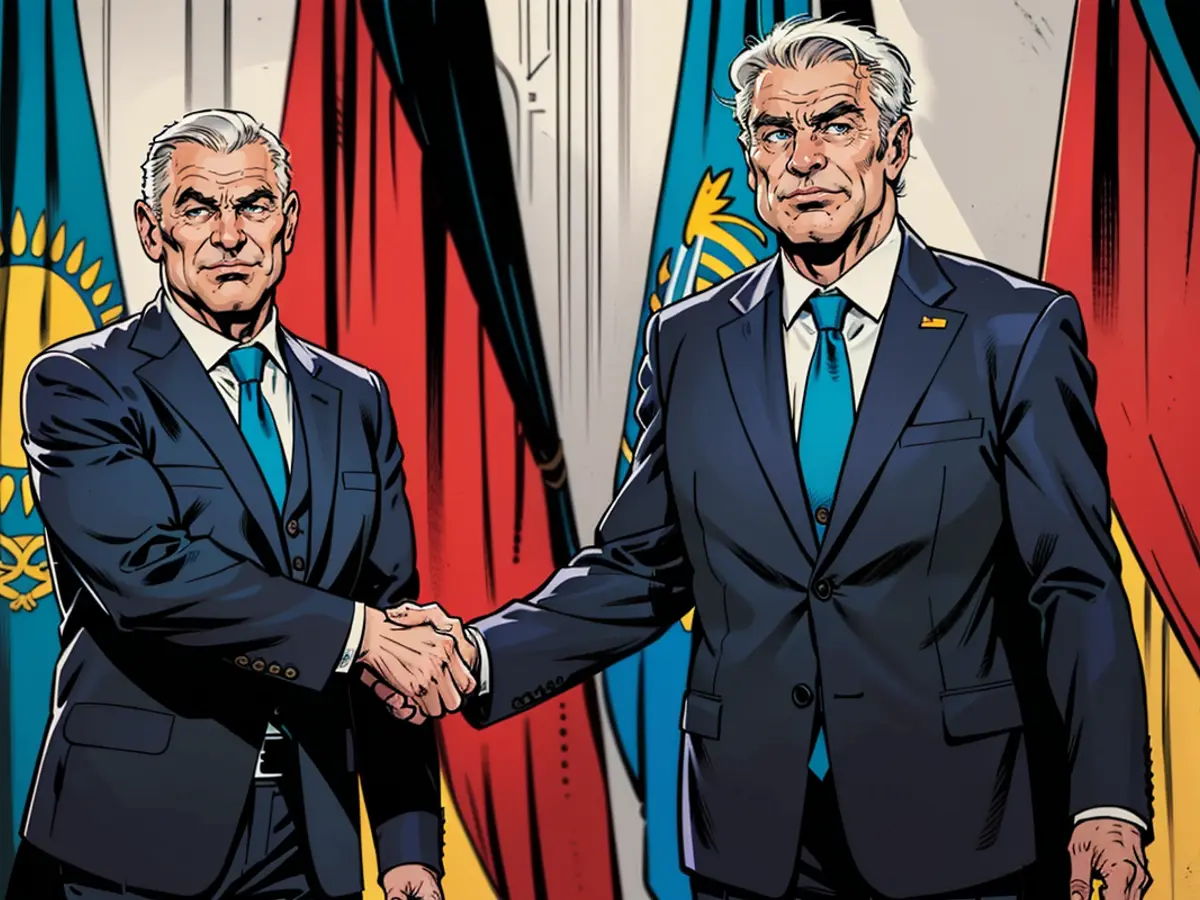Germany and Kazakhstan are strengthening their relationship.
Germany aims to lessen reliance on powerful suppliers like China and Russia. In quest of new alliances, Chancellor Scholz journeys to Kazakhstan. President Tokayev offers additional oil deliveries and scarce earth elements to the chancellor. Both discuss the conflict in Ukraine.
During German Chancellor Olaf Scholz's visit, Kazakh President Kassym-Jomart Tokayev referred to Russia as unconquerable and promoted immediate negotiations to resolve the Ukraine conflict. "Further escalation of the war will result in catastrophic consequences for all mankind, particularly for the nations directly involved in the Russian-Ukrainian conflict," he stated, as reported by Kazakh news agencies. "It is a fact that Russia is invincible militarily," he continued.
According to Tokayev, there is still "an opportunity for peace." He suggested that all peace proposals be taken into consideration and that hostilities cease first, followed by addressing territorial disputes.
Scholz emphasized Germany's commitment to supporting Ukraine against Russian adversaries while also advocating for a peace conference involving Russia. "Now is the moment to explore possibilities," Scholz said, adding that Russia must halt aggression to contribute to peace negotiations.
More Oil for Germany
Scholz's visit to Kazakhstan focused on strengthening economic ties. He mentioned his desire to "improve opportunities for economic relations" and highlighted the importance of "reliable, precise, and consistent cooperation" in the resource sector.
Kazakhstan is Germany's third-largest oil supplier, accounting for an 11.7% share, behind Norway and the United States, and has partially replaced lost Russian supplies to Germany's PCK refinery following the Ukraine attack.
During the visit, an extension and increase in oil deliveries beyond 2024 were agreed, although the specific quantity was not initially disclosed. Last year, Kazakhstan supplied approximately one million tons of oil to PCK, with 1.4 million tons agreed upon for this year.
Tokayev stated that the visit would raise the relationship between the two countries to a new level. "Our bilateral cooperation will be expanded in the spirit of a strategic partnership," he said, mentioning the establishment of a rare earths trade consortium and welcoming plans by HMS Bergbau for a lithium mine in eastern Kazakhstan with an investment of $500 million.
"Technology for Resources"
Tokayev highlighted that Kazakhstan possesses 19 of the 34 resources categorized as critical and is ready to increase oil exports to Europe. "70% of our oil exports go to the European Union. We are prepared to further unlock our export potential and contribute to overcoming energy shortages," he said, encouraging German investments in Kazakhstan.
Scholz expressed great interest in resource collaboration, as companies sought to diversify their import sources. Germany proposes processing resources initially in Kazakhstan, generating additional value for the local economy, unlike China. Tokayev confirmed the principle as "technology for resources."
Restrictions on Freedom of Press and Speech
Kazakhstan, home to over 20 million people, is the ninth-largest country by area and Germany's most significant economic partner in the region. Thanks to trade with neighboring Russia and China, the country has experienced above-average economic growth for years.
The German government is interested in Kazakhstan's oil reserves, gas, and, in the long term, hydrogen derived from renewable energy. However, the country, led by authoritarian President Tokayev, faces criticism for its human rights record. Freedom of the press and speech are significantly constrained. The joint press conference originally scheduled for Tokayev and Scholz was abruptly canceled by the Kazakh side. In Uzbekistan, the first stop on Scholz's three-day tour, a joint press conference was never planned from the outset.
In the context of strengthening economic ties, Chancellor Scholz expressed interest in a rare earths trade consortium with Kazakhstan, as President Tokayev mentioned the country's abundance of rare earths. Additionally, the potential for HMS Bergbau to establish a lithium mine in eastern Kazakhstan with a $500 million investment was welcomed by both leaders.








